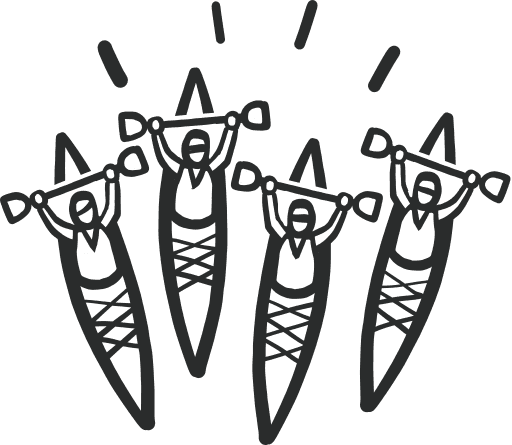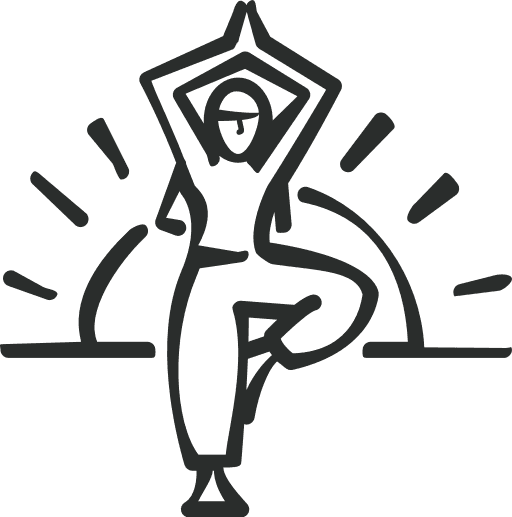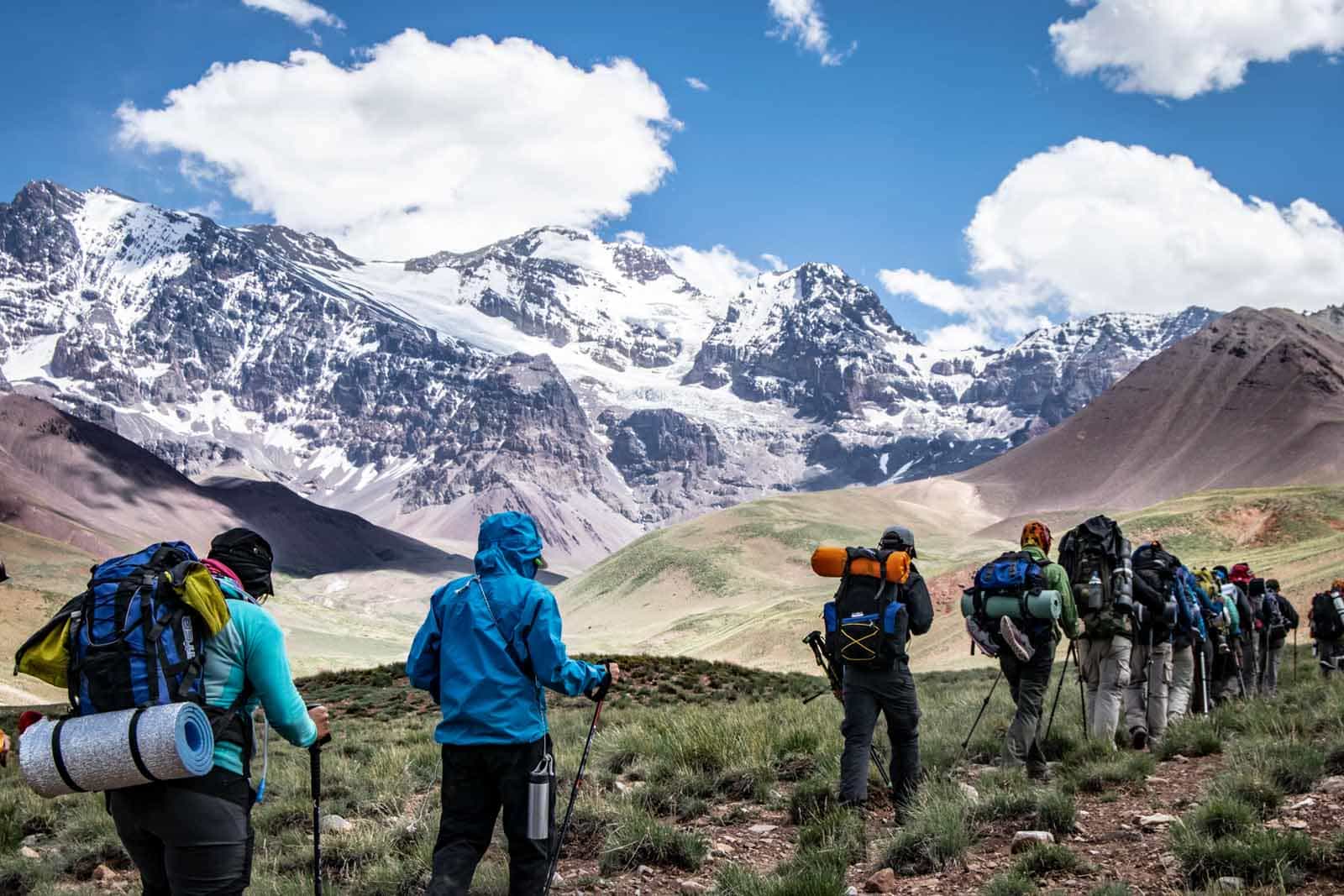
What's Included?
Activities & Certified Guides
All itinerary activities with expert, local, English-speaking guidesAll accommodation
1 night in a hotel in Mendoza, 5 nights wild camping, and 1 night in a cabinMeals
All breakfasts, 6 lunches and 6 dinnersTransfers
Airport and local transfers, with porterage (by mule) of 10kg of personal luggage during the trekEquipment
Tents, cooking and safety equipmentSmall Like-minded Groups
Solo-friendly by design, join our small n’ sociable groups of up to 12 like-minded, active and outdoorsy people…
…
What's it like?




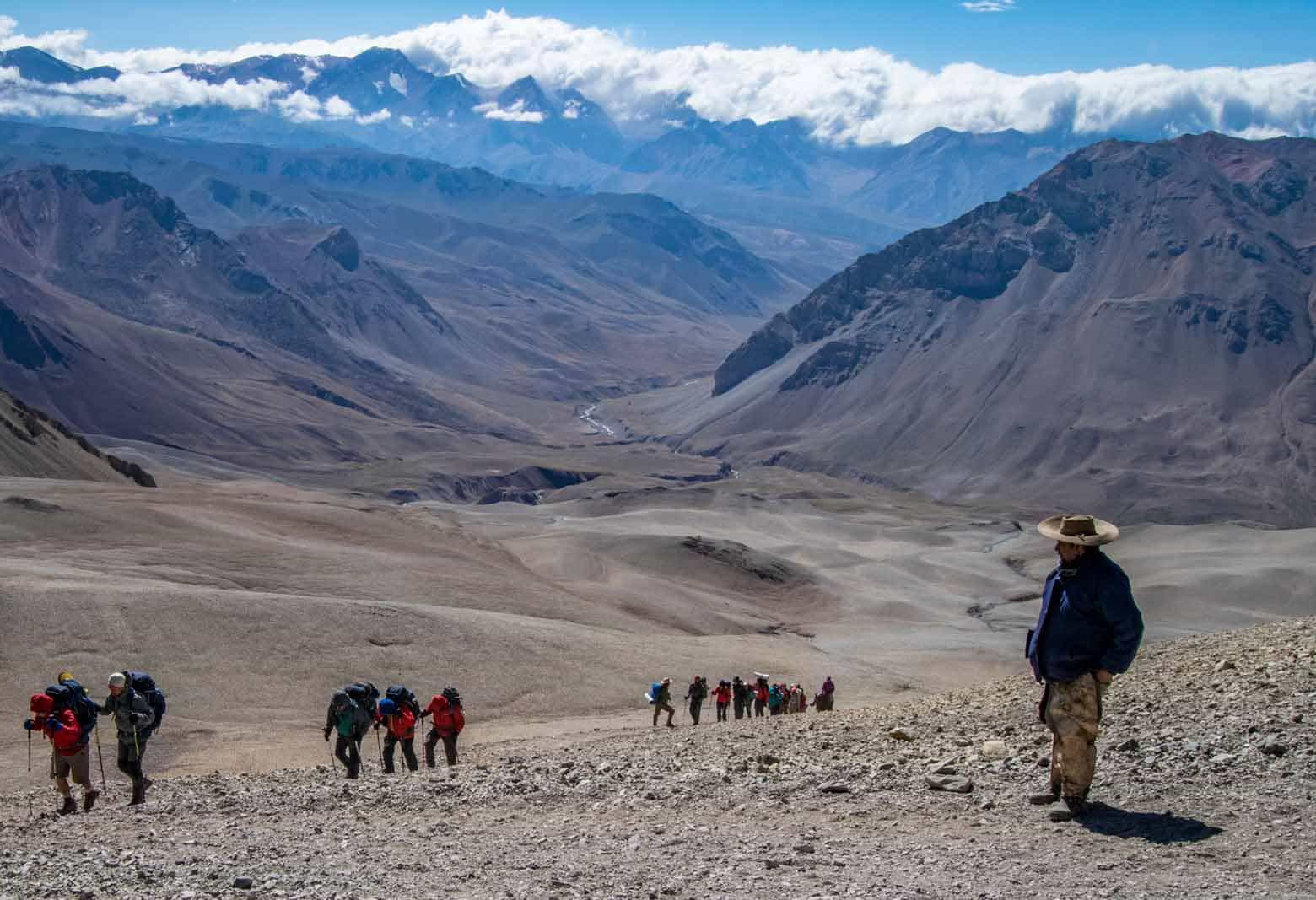
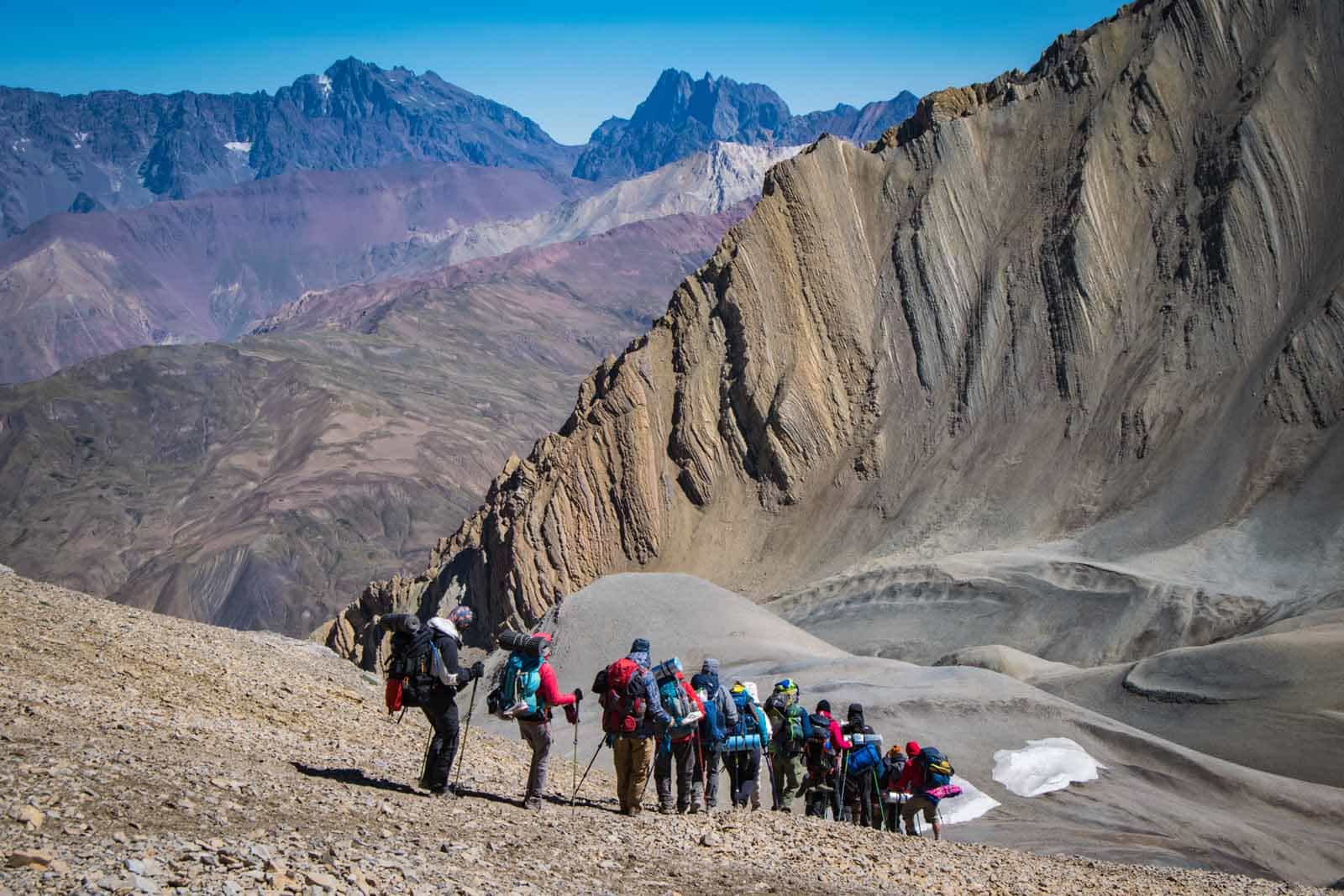
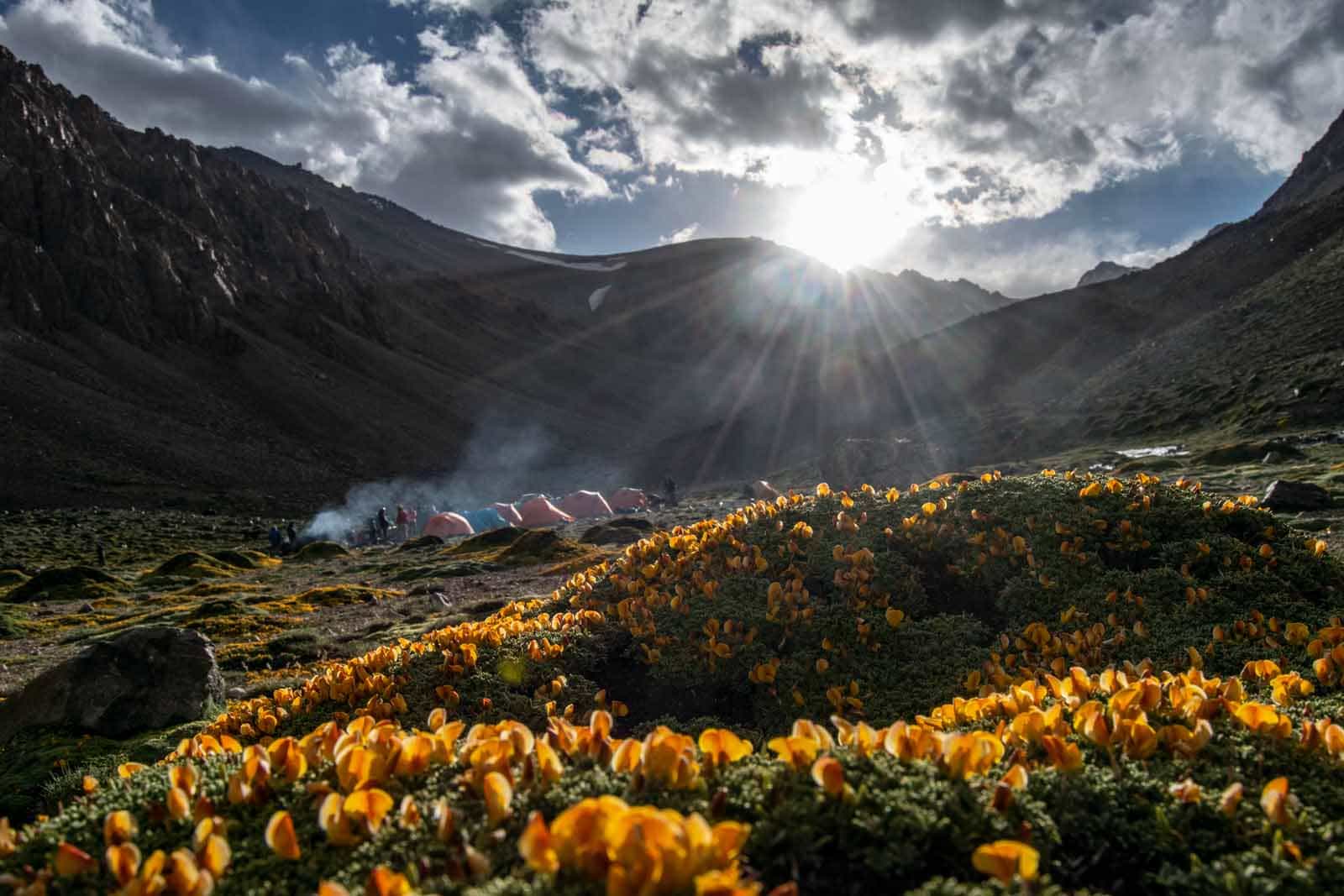
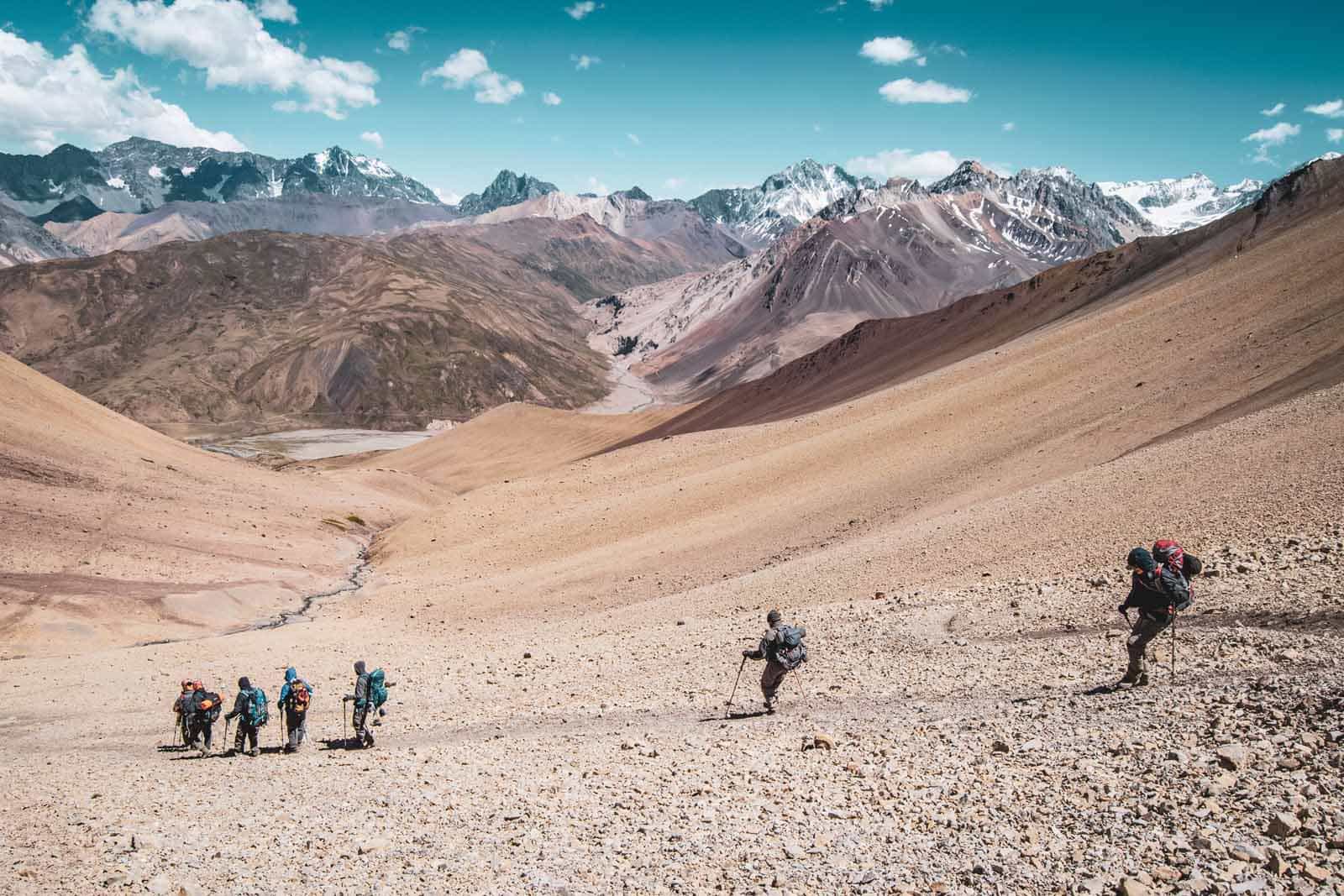
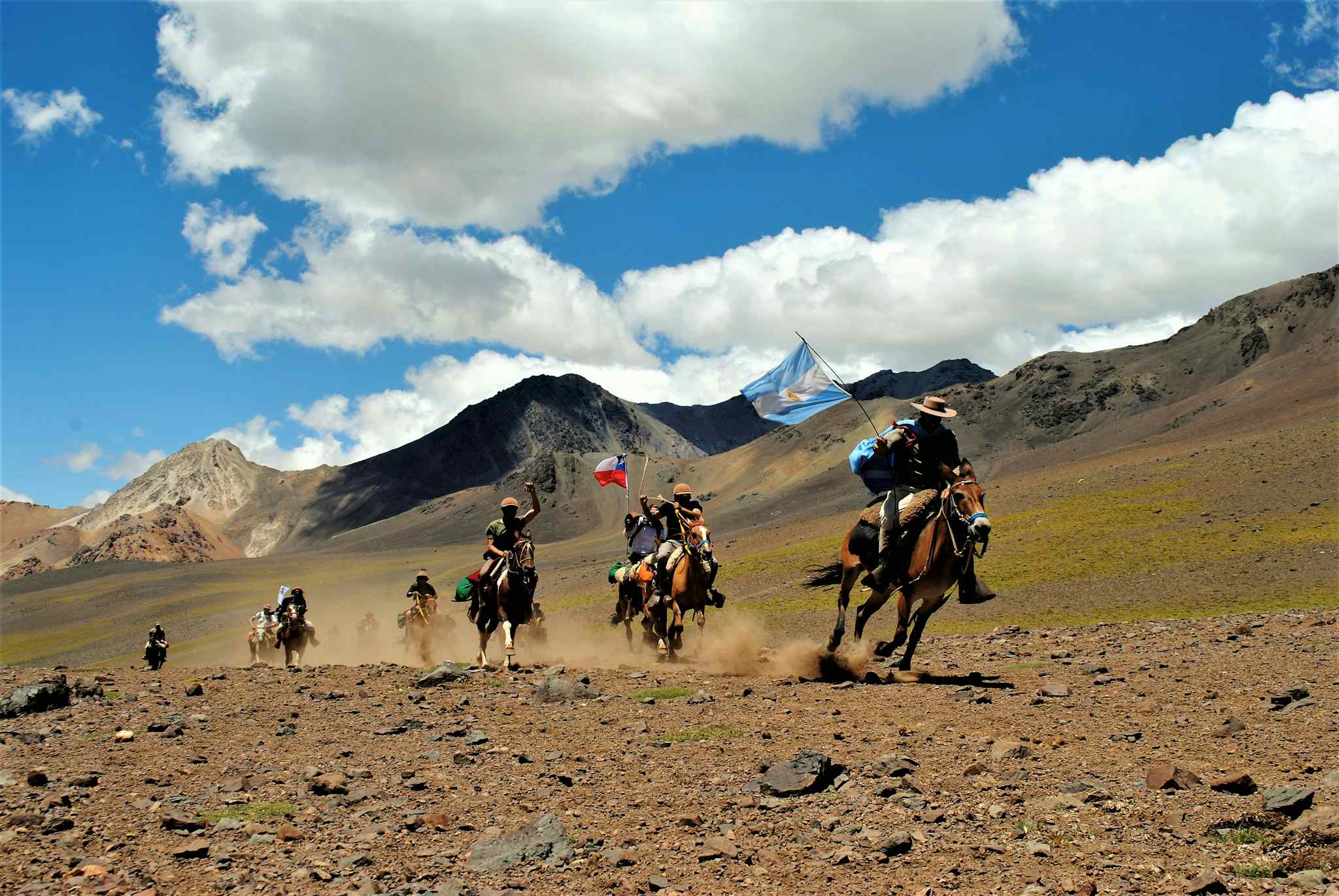
Trek into the wilderness through deep valleys, remote gorges and ancient glaciers, eyes open for condors and guanacos
Burst through the cloud line and tackle the Portillo Argentino high pass, topping out at an altitude of 4380m
Melt away those achy limbs in the Termas del Plomo natural hot spring and celebrate with a vino tinto in Chile's wine region
Key Information
Day 1
Welcome to Argentina
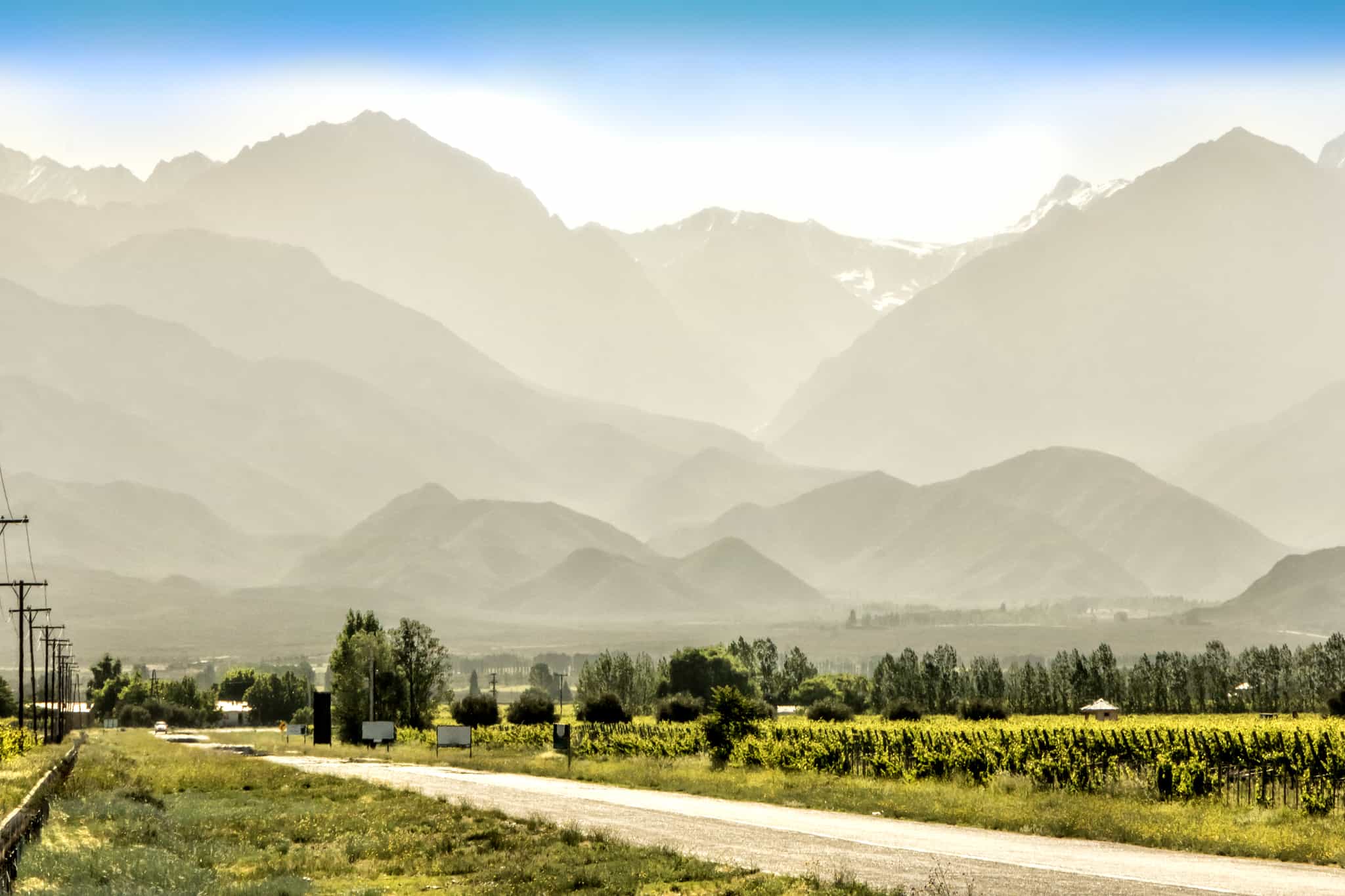
Pick up from Mendoza Airport and transfer to your hotel in the city. Your guide will meet you in the lobby at 15:00 to check that everyone is ready to go and answer any last-minute burning questions. Probably a good idea to resist the Malbec tonight – your expedition begins in the morning.
Day 2
Trek to Cajón de Arenales
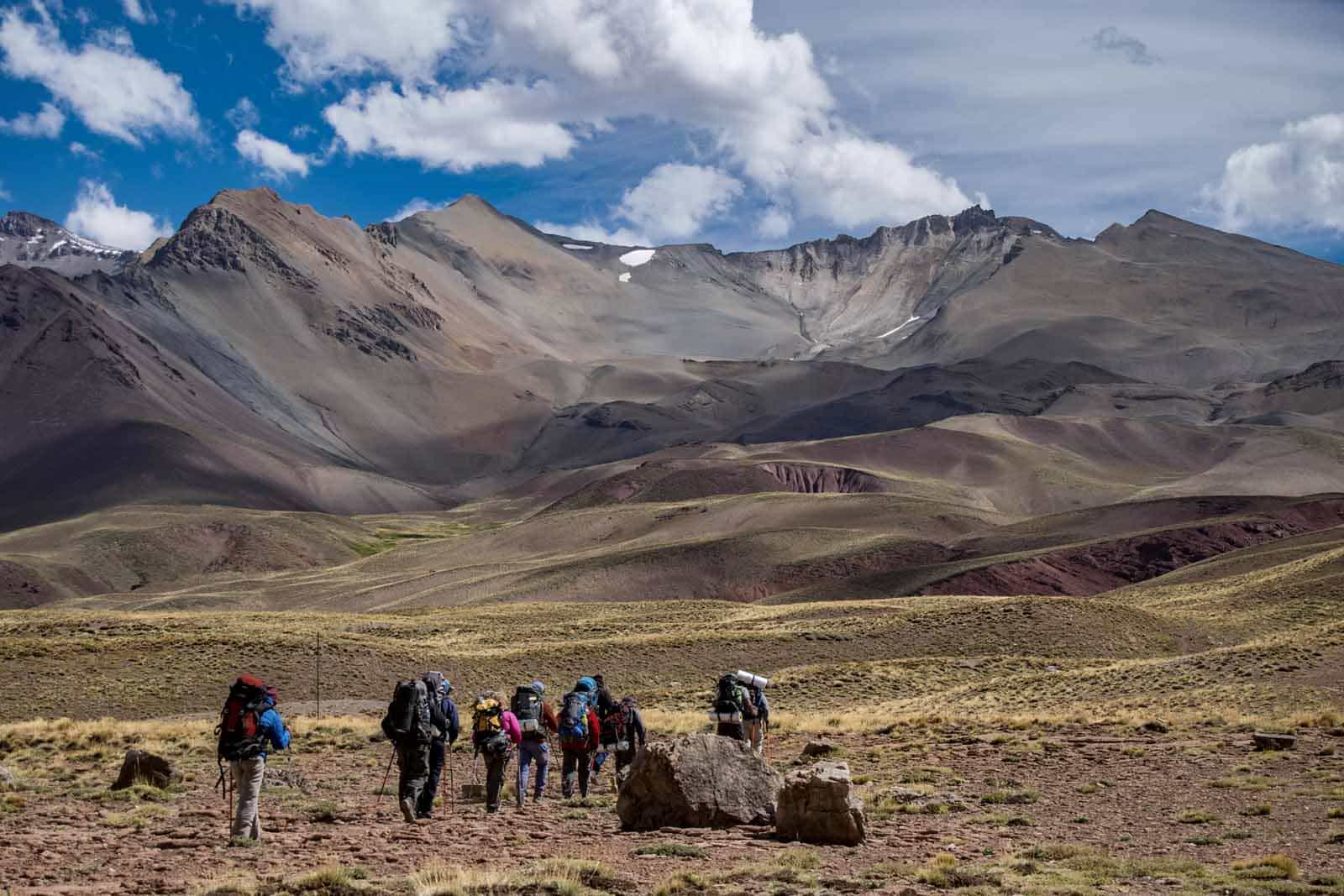
Hiking
After breakfast your guide will meet you and your crew at the hotel, ready for the short drive to Manzano Histórico. Your acclimatisation trek starts here! You’ll head up into the foothills of the Andes and on to Refugio Portinari where you'll be assisted in completing some customs formalities with the Argentine authorities before heading off into the mountains. From here you'll continue to your first camping spot at Cajón de Arenales. Tents are provided but you may decide to deck out under the stars.
Day 3
Trek to Scaravelli
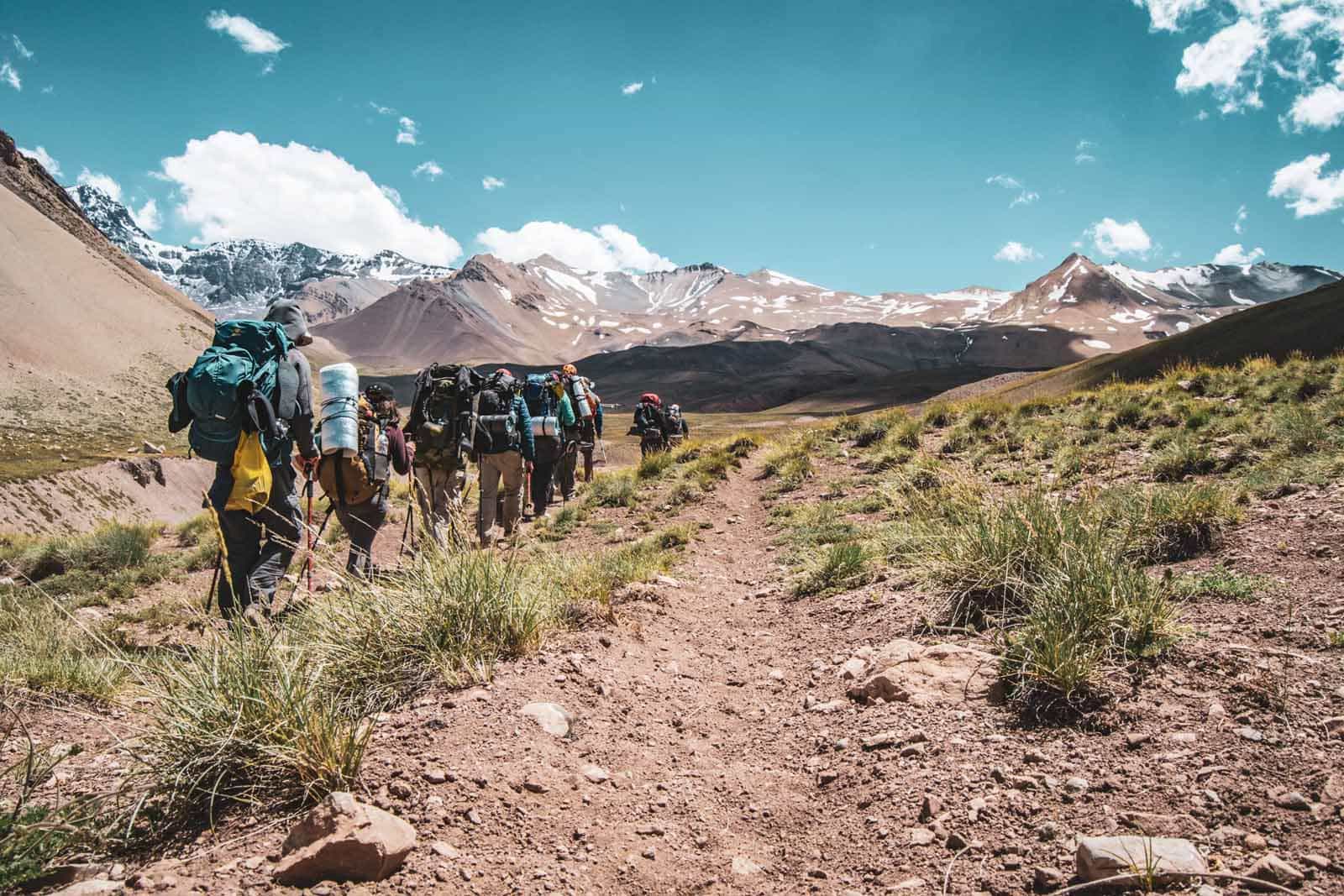
Hiking
Today you'll continue to gain elevation, following the Arenales River and trekking through the cloud line. The mountain pass between Mendoza province and Santiago de Chile is the same route that the liberation 'Army of the Andes' took in 1817, led by Generals San Martin and O'Higgins. The mountain battle eventually led to Chile winning its independence from Spanish rule. You'll spend the night at Scaravelli Refuge, an incredible spot to refuel the batteries.
Day 4
Climb the Portillo Argentino Pass
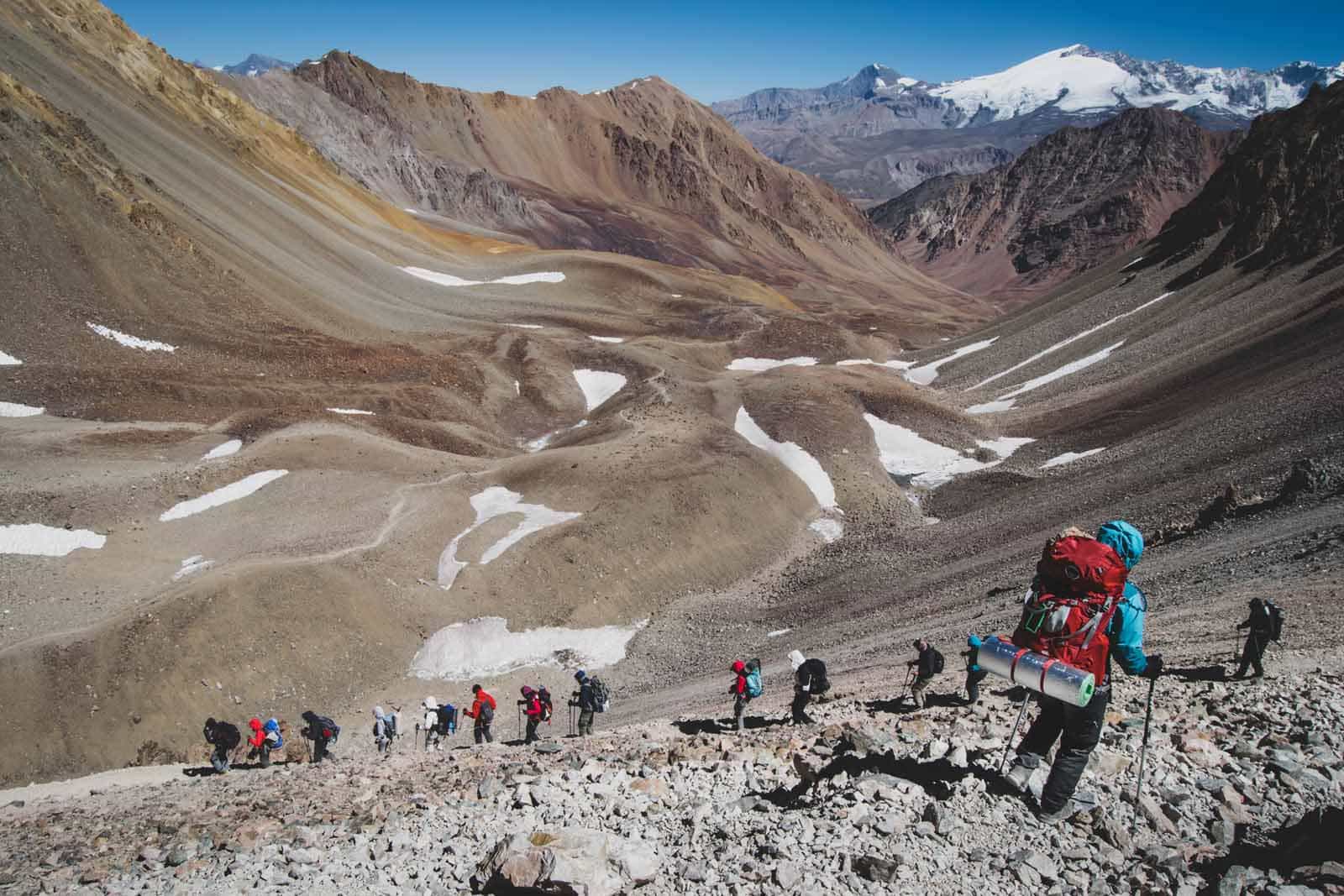
Hiking
A tough day today as you venture further into the heart of the Andes range and climb the 'Portillo Argentino' high pass, rising to a peak altitude of 4380m before a long walk down to the Real de la Cruz refuge. Charles Darwin used the Piuquenes Pass (in reverse from Chile to Argentina) as part of his travels in 1835, which he wrote about in his book 'The Voyage of the Beagle'.
Day 5
Acclimatisation day
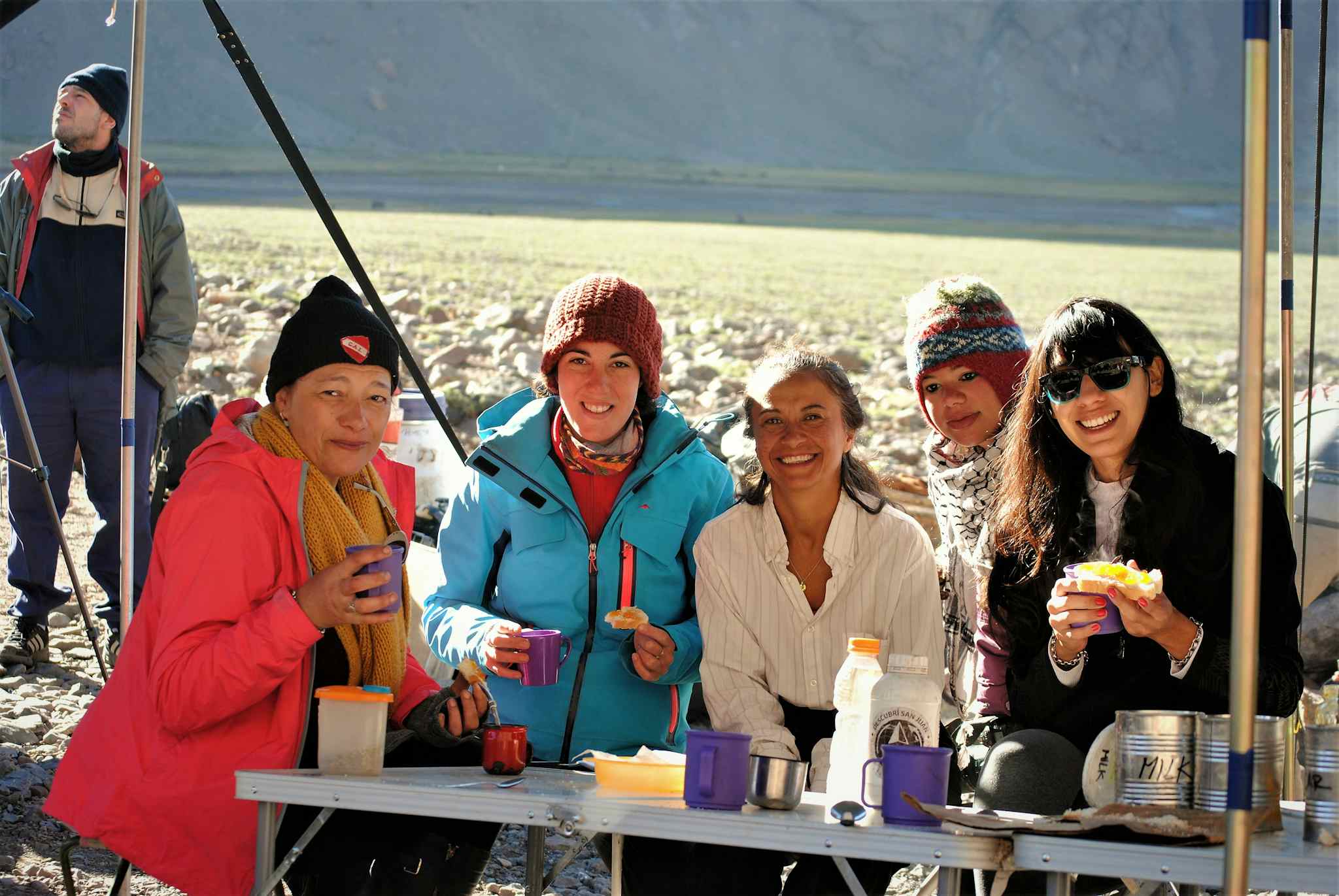
Today is a designated rest and acclimatisation day to recuperate from yesterday and prepare for the next long hike tomorrow. Breathe in the fresh mountain air and enjoy the view, tomorrow is a toughy. There is also the option for a short walk (no elevation gains/losses) to the nearby Laguna de los Patos.
Day 6
Trek to El Caletón
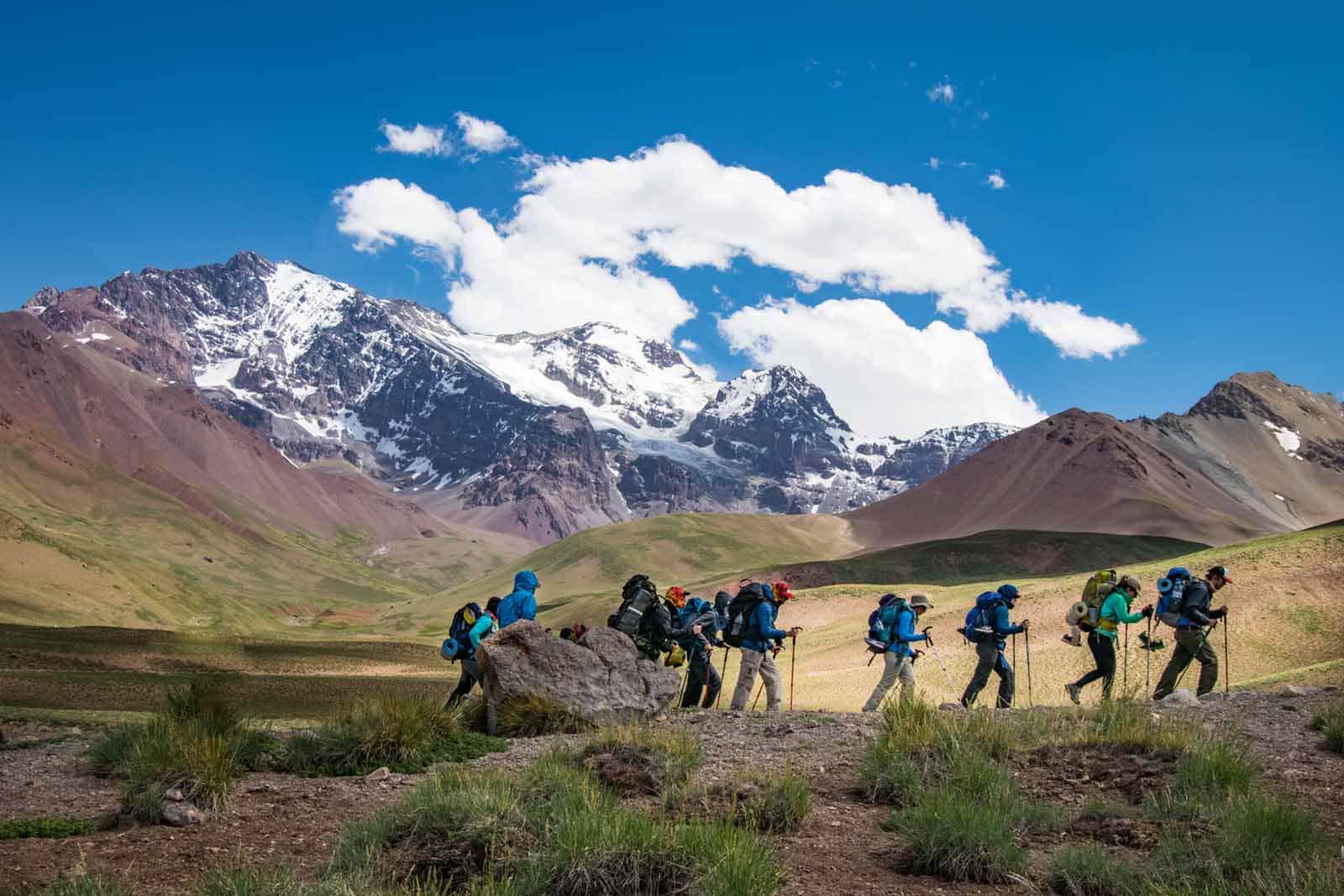
Hiking
Today you'll move westwards again and cross the Tunuyán River, enjoying views of the nearby Mount Tupungato (6800m). The trail then follows the Palomares River upstream until the last campsite in Argentinean territory, El Caletón.
Day 7
Cross the Chilean border
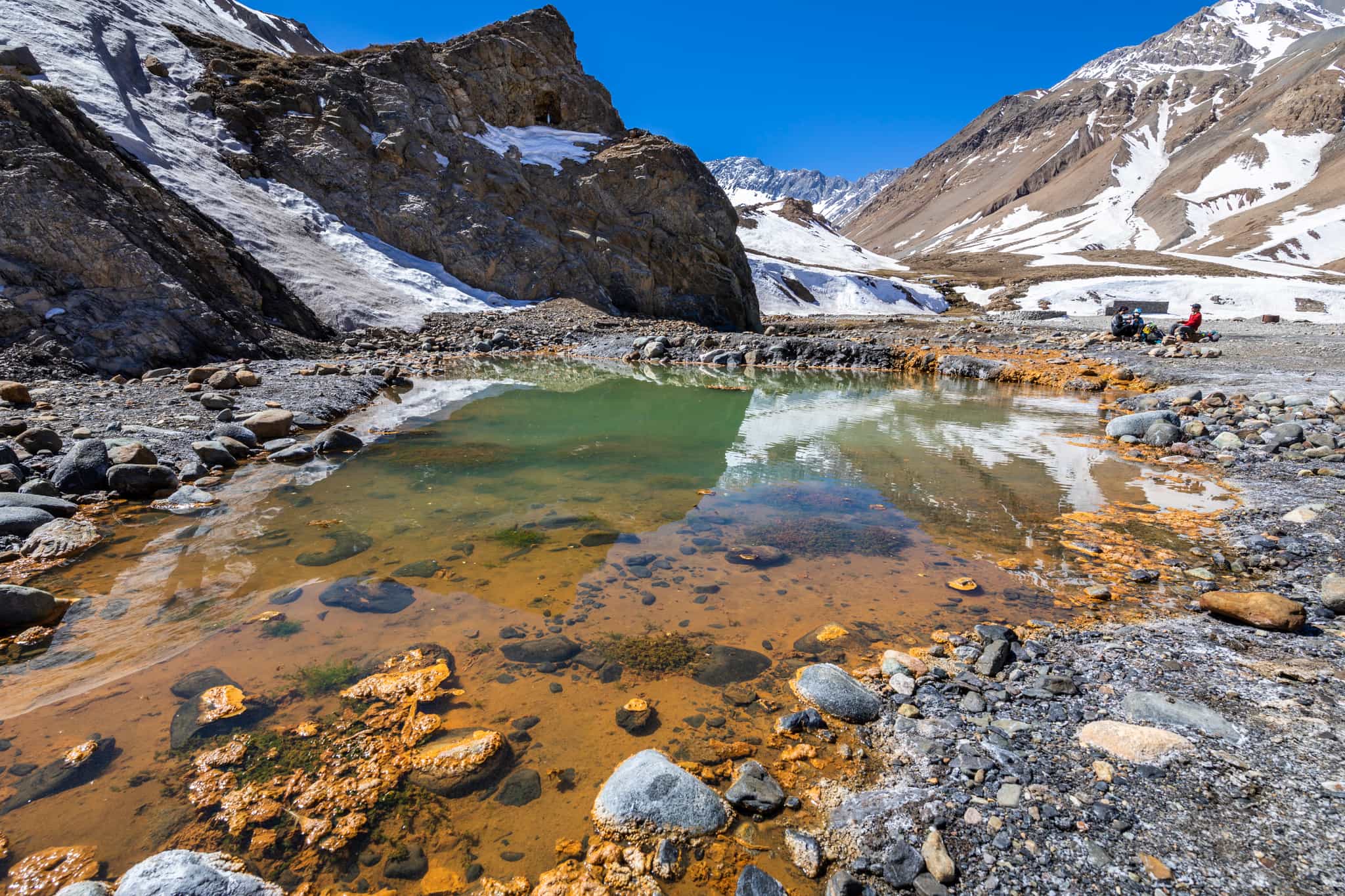
Hiking
Today is another big day, and the last push before arriving on the other side of the Andes. You'll reach the 'Paso Piuquenes' boundary mark indicating the border between Argentina and Chile. After lunch the support muleteers and mules will change shifts and hand over their duties to a Chilean crew for the remainder of the trek. The final leg of the expedition involves a long descent ending at Termas del Plomo, a natural hot spring perfect for a well-earned dip. After crossing El Plomo River, a van will be waiting to drive you to Cajón del Maipo. You'll stop in the small town of San Gabriel for some more customs bits and end up in your accommodation for the night, a rural hotel and a slap up farewell dinner.
Day 8
Transfer to Santiago de Chile
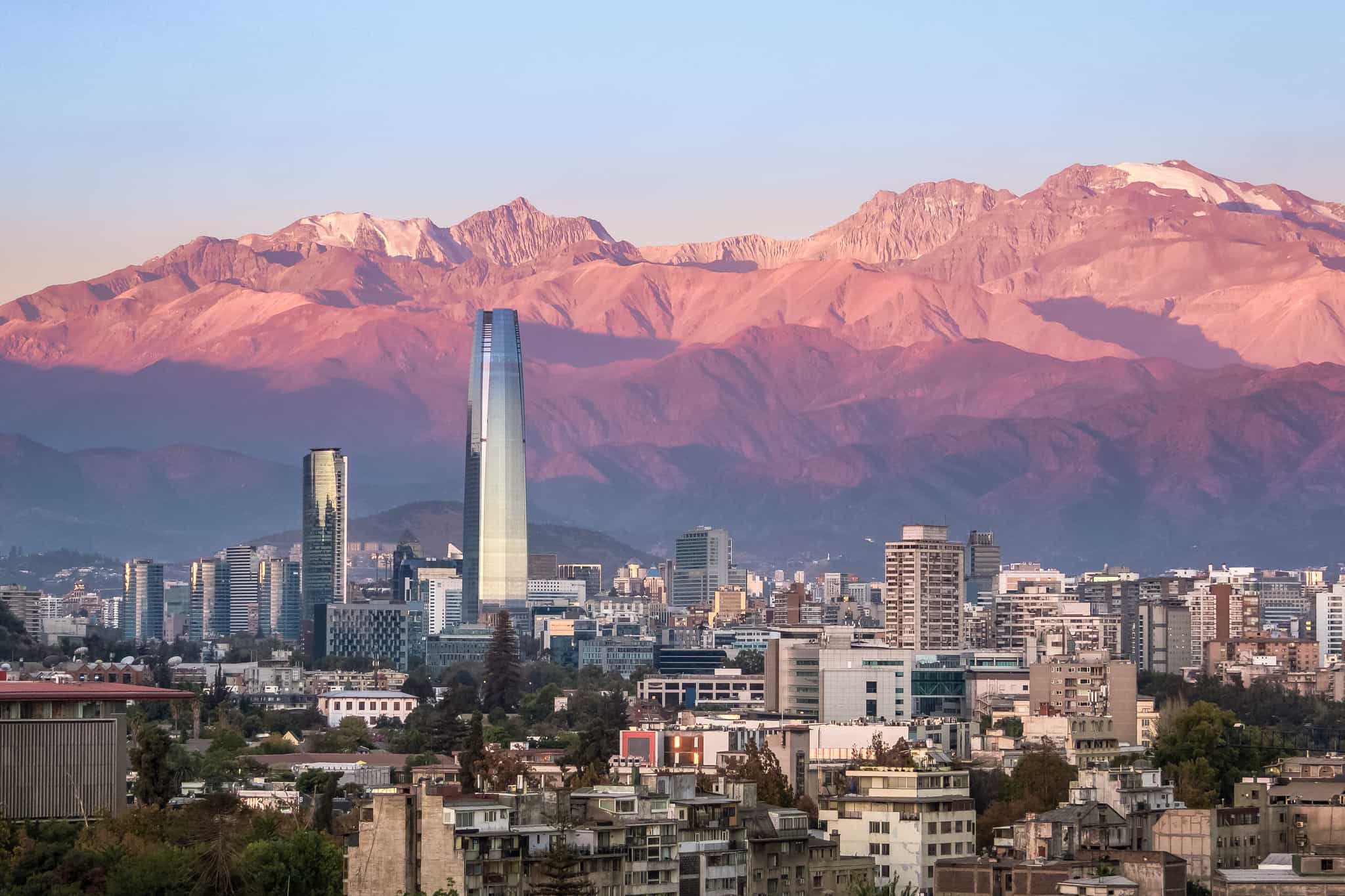
Driving
All good things must come to an end, as you bid farewell to the Andean mountain range which you've called home for the last week. This morning you'll transfer by road from Cajón del Maipo to Chile's capital city, Santiago de Chile (an approximately two-hour drive). Drop-offs can be made either at the airport or at a centrally located hotel, if you are staying on in Chile.
The Area
Logistics
Starts
Mendoza Airport (MDZ), Argentina
Any time on Day 1
Ends
Santiago de Chile Airport (SCL) or a central city location, Chile
Late morning on Day 8
Transfers
Your host will meet you on arrival at Mendoza Airport and transfer you to your hotel accommodation for the night. There are no planned activities on this first day, however, you'll be able to meet your guide at the accommodation around 15:00.
On Day 8, there is a road transfer from Cajon del Maipo onwards to Santiago de Chile (which takes approximately two hours). You can choose whether to be dropped off at Santiago Airport, or at a central location/hotel in the city.
If you choose to arrive early, your host can book extra pre-trip nights for you in a hotel in Mendoza, should you wish – see Optional Extras for prices.
Travel options
This trip starts in Argentina and ends in Chile.
There are international flights to Mendoza from various major hubs in Europe, with connections in either Santiago de Chile (SCL), Sao Paulo (GRU) or Buenos Aires (EZE). Some airlines offer multi-destination round trips.
There are regular flights from Santiago de Chile to Mendoza and international bus services connecting Santiago de Chile with Mendoza should you wish to return to Argentina at the end of the trip.
Once in Santiago de Chile, you are in the ideal spot to extend your adventure. Connect to either southern Chile (Pucón and Puerto Varas are the outdoor adventure hub towns in the south), Patagonia (Puerto Natales is the basecamp for heading to Torres del Paine National Park) or up to San Pedro de Atacama in the far north of the country.
Day 1
Breakfast
Lunch
Dinner
Day 2 – Day 6
Breakfast
Lunch
Dinner
Day 7
Breakfast
Lunch
Dinner
Day 8
Breakfast
Lunch
Dinner
What is the food like?
Throughout the adventure, you'll be fuelled by healthy and typically Andean food using locally sourced ingredients. For the first few days of the trek you’ll carry fresh products such as fruit, meat and veg. Lunch usually consists of empanadas or sandwiches with snacks. Dinner is always a warm and filling meal after a big day of hiking, with the team typically cooking up either a BBQ, stew or pasta dish.
Vegetarians, vegans and other dietary requirements and allergies can be catered for – but please make sure that this request is made as early as possible on your passenger info form. Please note that options for vegans will be limited. Gluten-free food can be carried and prepared; however, this does incur an additional cost (approximately $20 (USD) per day whilst on the trek).
What is the accommodation like?
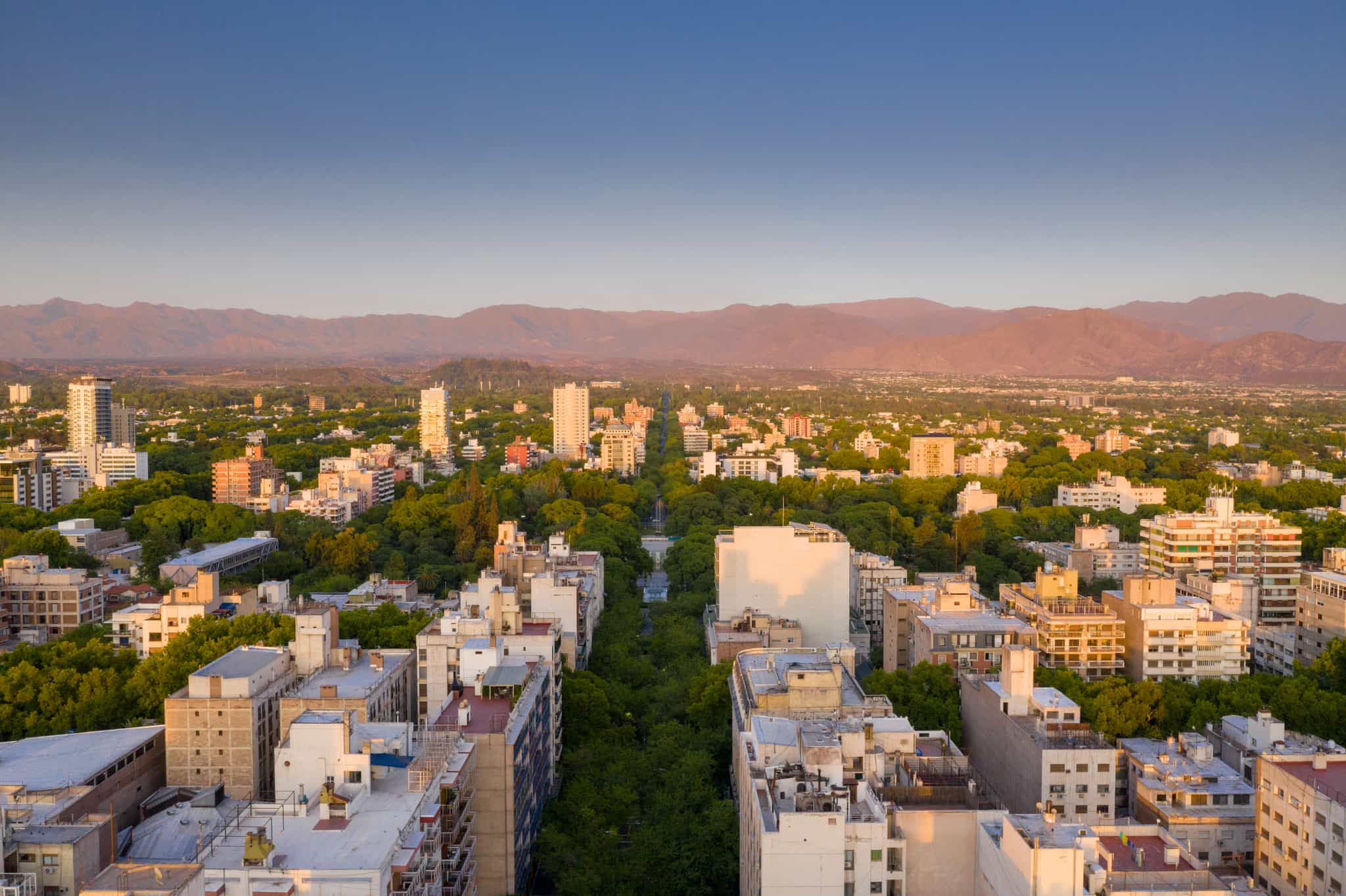
Mendoza
For the first night of the tour you'll stay in a comfortable hotel in the city, such as Hotel Agua del Corral, or similar. Rooms are twin-share and with en suite bathrooms.
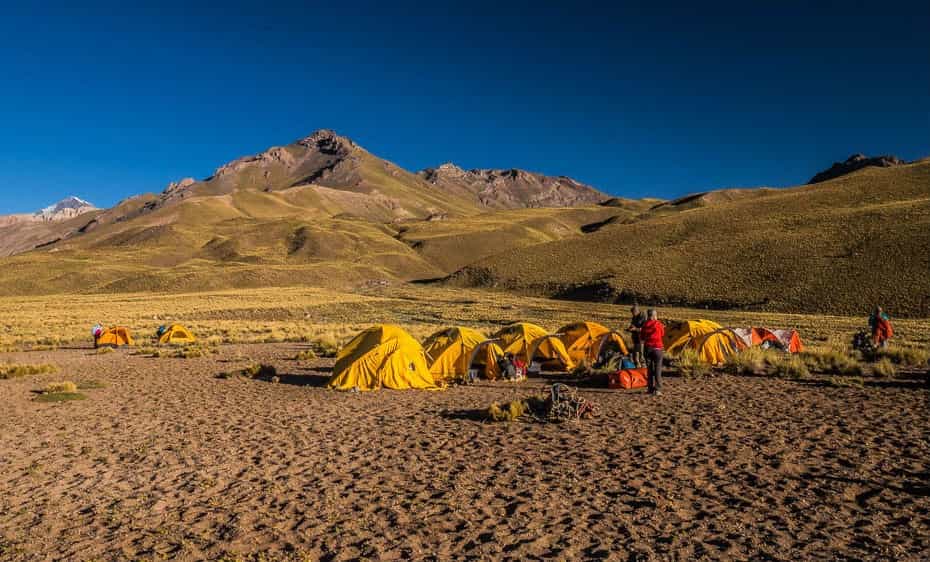
Camping
You'll spend five nights camping during the trek, sleeping in good-quality twin-share expedition tents. The tents are provided and transported for you (outside of your personal luggage allowance), although you will need to bring your own sleeping bag and sleeping mat. The support team will also carry an additional dining tent for common use.
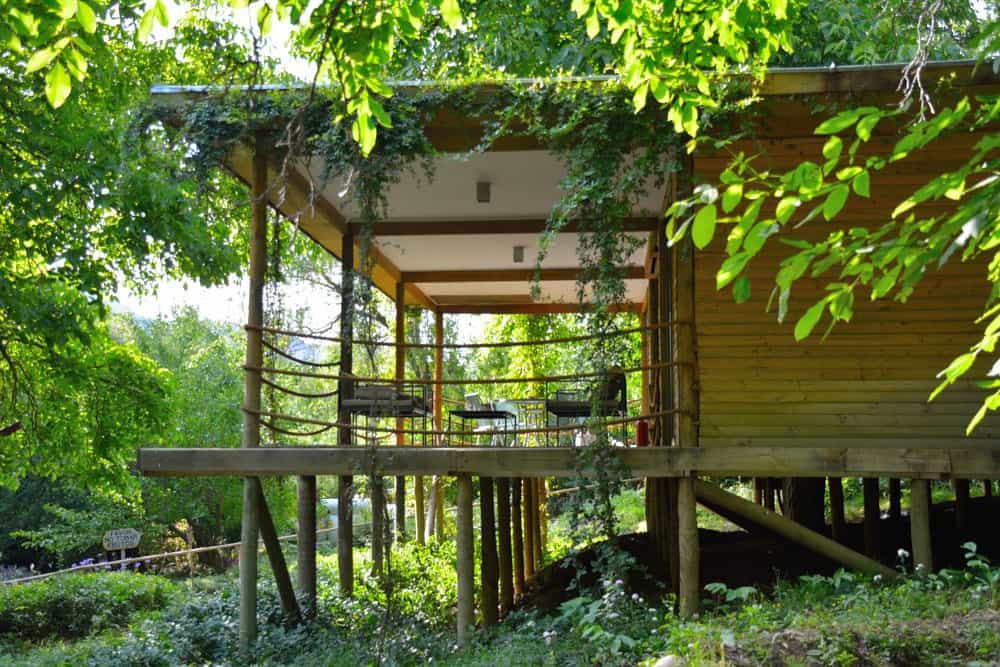
Cabins
On the last night of the tour, after arrival in Chile, you'll spend one night in a wooden cabin (twin-share rooms) at a rural hotel in the Cajon del Maipo region.
Upgrades
For solo travellers looking for their own space, an optional private room and tent can be booked for an extra charge, see Optional Extras for the price. Please request this at the time of booking (this is subject to availability).
This trip has been rated as Challenging
This is a challenging trek that takes place in a remote area of the Andes and involves physical exertion at high altitude (see the altitude FAQ for more info). A good level of fitness and previous trekking experience is required (although no technical mountaineering experience is needed). You'll be trekking for approx 6-9 hours per day covering distances of up to 16km, and elevations of up to +/- 1000m. Day 4 in particular involves a large ascent over a high pass, followed by a large descent. The high passes may involve walking through snow, depending on the conditions at the time.
Your host in Argentina recommends that all participants conduct an ECG (Electro Cardiogram) scan and blood pressure check within the three months prior to the trip, to check for any hidden heart irregularities. Presenting these to the host is not mandatory however we recommend taking these precautions in advance of any high-altitude trek to be certain of your fitness levels. In the weeks leading up to departure, and especially in the preceding days, it is recommended that you do some aerobic exercise, eat healthily, rest and avoid alcohol or smoking in order to approach the trek in good shape.
The distances and stats mentioned in the day-to-day itinerary are given as an approximate guide only. The guide will take into account the local conditions and the strength/speed of the group when determining the exact distance and route each day.
What will I need to carry?
This is a multi-day linear hike, and all luggage needs to be carried during your trek. You'll have porterage of one bag weighing up to 10kg included (the support staff includes working mules to carry some luggage and equipment for camping and cooking).
You'll need a backpack to carry personal items during each day of hiking, and large enough to accommodate any weight over the 10kg being portered for you.
Departures are scheduled throughout the summer season only (Nov-Mar). Typical summer weather conditions in this part of the central Andes of Argentina are dry, clear and warm during the daytime, with the temperature dropping significantly at night. During the trek, whilst at high altitudes, you can typically expect daytime temperatures to reach approx. 25 ºC but at night it can be as low as -2 ºC. There are two high passes during the crossing (Portillo Pass and Piuquenes Pass) where wind conditions can be a factor, and earlier in the season there can still be a snow covering. Your guides monitor the conditions via specialist websites in order to stay prepared and share information.



A delightfuly desolate trek
First the good and the great, some highlights include: •The untouched nature and the fact that you will get it almost to your self. It’s the most remote adventure I’ve been on. •The wonderful guides whose energy seamed to be never ending. •Getting really up and close with guacho culture. •The food.
The could be better: Although the guides where absolutely great I felt at times like they where part of an organisational structure that could have worked better. For example; the chosen partner for renting gear in Mendoza is not reliable. Furthermore my clear communications about having my own tent had not been forwarded from the office to the guides. Now the guides solved these situations beautifully but they needed not to have arisen at all.
It should also be noted that the iternerary was somewhat changed for reasons not related to weather or safety. I did not mind really but I think it’s good to know for future adventures.
My suggestions for those who is thinking of booking this trek are: Do it! You won’t regret it; it’s a once in a lifetime experience. Just make sure to bring as much own gear as possible and if you rent or make special arrangements; check and double check them before leaving Mendoza.
Amazing Andes
The trek across the Andes was full of incredible views, local culture and lots of laughs with the group. This was a very rewarding trip with excellent guides and assistance throughout. While booking was easy and the guides themselves were great, there were some organisational issues around equipment and timing so we didn't make it to the hot springs but had a lovely final meal together in Chile.
The best thing about this
The best thing about this trip, besides the stunning mountain views and incredible night sky, are the local guides and Argentinian food. The guides were thoughtful, patient, answered 100 questions a day with a smile, and sensed what we needed before we knew we needed it. The group dynamic was great, but the guides made it even more fun. Also, the food was epic. Don't expect to lose any weight on this trek!
Itinerary Activities
- Guided acclimitisation hike from Manzano Histórico to Cajón de Arenales
- Guided hike from Cajón de Arenales to Scaravelli
- Guided hike across the high pass of Portillo Argentino (4380m)
- Acclimatisation day at the Real de la Cruz refuge, with optional hike to Laguna de los Patos
- Guided hike across the Tunuyán River to El Caletón
- Guided hike across the historic Piuquenes Pass into Chile
- Dip in the natural hot springs of Termas del Plomo
Guides
- Expert, local, English-speaking guides
Accommodation
- 1 night in a city hotel in Mendoza
- 5 nights wild camping in the High Andes
- 1 in a tranquil rural cabin in the Cajon del Maipo region
Meals
- 7 fresh breakfasts
- 6 packed lunches of empanadas or sandwiches
- 6 hot, filling dinners that will be cooked up for you by your crew
Transfers
- Arrival transfer from Mendoza Airport (Argentina) at any time on Day 1
- Group departure transfer to Santiago Airport (Chile) on Day 8
- All transfers during the trip
Porterage
- Up to 10kg of personal luggage will be carried during the trek by working mules
Equipment
- Tents, cooking and safety equipment
Our trips are hassle-free by design. We include all the activities and equipment, as well as many of the meals, so you can simply rock up with your rucksack and share the adventure with your new pals.
Travel to and from the trip
Our trips do not include flights, trains or other travel to the start point and back from the end point.
Tips
Tips for the guiding team are not included in the trip cost. These are entirely at your discretion but there is an expectation to tip for good service. Your guide will help with advice, however we suggest the below as a guideline per person:
- $5-10 (USD) per day, per guide (or equivalent in Argentine pesos)
- $3-5 (USD) per day for 'muleteer' porters
Of course, you are free to tip more or less, and the amount should be reflective of your perception of service and quality – a tip is not compulsory and should only be given when you receive excellent service.
Personal Expenses
You know your own spending habits best, so please budget an appropriate amount for things like optional meals and drinks, shopping, optional activities, and laundry.
Travel insurance
Travel insurance is compulsory for all of our adventures and you are required to provide your policy information before departing. Your insurance should include adequate protection for overseas medical treatment, evacuation/repatriation, your baggage and equipment and the specific activities involved on your adventure. We also strongly recommend it includes cancellation and curtailment insurance, should you be unable to join your trip for specific reasons such as illness. Our recommended travel insurance provider is Campbell Irvine, as their insurance offers all of the above.
Visas
Visa requirements often change, and you are responsible for obtaining any required visas for this trip. Please check with your nearest embassy or consulate for up-to-date advice.
What's included?
- Tents (The North Face) with solar panels and lights
- Chairs and tables
- Communal tent
- Satellite communication
- Food and cooking equipment
- First aid kit
- 24-hour emergency contact with your host's HQ in Mendoza
What's available to hire?
- It's not possible to hire any equipment directly from your host. However, they do recommend a local shop in Mendoza with kit available for hire (sleeping bags and mats), called El Refugio. If intending to rent, kit make sure you double check availability before you arrive and factor in sufficient time to visit the shop upon arrival. Note: if you do not intend on returning to Mendoza at the end of the trip (as the trip ends in Chile) then you can still rent items and the guide will return them on your behalf.
What do I need to bring?
BAGS
- Soft bag (e.g. backpack or kitbag) which mules will carry
- Comfortable daypack for trekking with
- Waterproof liner/drybags
CLOTHES
Essential
- Down jacket with hood x1
- Waterproof & windproof Gore-Tex jacket with hood x1
- Fleece jacket x1
- Long sleeve undershirt x1
- Thermal base layers x1
- Warm gloves
- Warm hat
- Sunhat
- Trekking trousers x1
- Hiking boots (worn in, Gore-Tex recommended)
- Assorted thickness socks
- Underwear
- 100% UV protection sunglasses (glacier glasses with side shields)
- Crocs or similar footwear for river crossings
- Sleeping clothes
Optional
- Breathable wicking layers as needed
- Buff or neckscarf
- Swimming costume for hot springs
SLEEPING
- Sleeping bag (to -15 degrees Celcius, 4-season)
- Sleeping mat (Thermarest or similar)
OTHER
Essential
- Head torch (with spare batteries)
- Suncream and lip protection (high SPF)
- Skin moisturiser
- Reusable water bottles (2x 1-litre)
- Spare plastic bottle
- Passport
- Travel insurance documents
- Universal travel plug adapter
- Personal items (biodegradable toiletries, medicines, sanitary wear etc)
- Toilet kit (toilet paper, biodegradable bags to carry paper out to dispose of)
- Quick-dry towel
- Alcohol hand-gel
- Insect repellent
- Spending money
Optional
- Sleeping bag liner
- Power bank or solar charger
- Personal first-aid kit (inc. blister treatment)
- Energy bars and snacks - read our article on Best Hiking Snacks
- Water purification tablets/treatment system
- Eye drops if sensitive or allergic to dust
- Camera
Extra 10kg Luggage Porterage
Payable Before Departure
Extra 10kg Luggage Porterage
… Per person
Single/Double/Twin Room in Mendoza
Payable Before Departure
Single/Double/Twin Room in Mendoza
… Per night
Private Room and Tent Upgrade
Payable Before Departure
Private Room and Tent Upgrade
… Per person
We partner with the World Land Trust to ensure this trip achieves Net-Zero emissions. We also support their Buy an Acre programme, helping local communities to buy and protect natural habitats in perpetuity.
What's the number?
It works out on average at 215kg of CO2 emissions per person, including all local transport, accommodation, food, activities, guides, staff and office operations.
The only thing it doesn’t include right now is flights and travel to the destination. We do make an overall estimate across all our customers separately, but as we don’t book flights, have customers from all corners of the world, and no way of reliably knowing their travel plans, we simply can’t include an individual number in the figure on display here. We’ve got a goal to fix that, so that when you book, there is a way to measure and mitigate the carbon emitted by your flight too.
But what does the number mean?
Yep, hard to picture eh? To give you an idea:
- Driving 1000 miles/1609km would be approximately 281kg of CO2 in an average car (or 140.5kg per person, if there were two of you in it).
- A return economy class flight between London and New York would be approximately 1619kg (1.66 tonnes) per person.
- 10 trees in a temperate forest are estimated to remove approximately 250kg of CO2 from the air in a period of 5-10 years.
What are we doing about it?
Our trips are relatively low-carbon by design, and we're working with all our hosts to develop long term carbon reduction plans. We partner with the World Land Trust to ensure this trip achieves Net-Zero emissions. We also support their Buy an Acre programme, helping local communities to buy and protect natural habitats in perpetuity, ensuring the protection of the reserve and its wildlife.
Want to know more?
Amazingly, no international travel company has ever publicly published their carbon measurements before, as far as we know. We believe that must change, quickly. So we’re openly sharing the method we used in the hope that other companies will be able to more easily follow suit and build on what we've done so far. You'll find it all here.
This trip visits locations which can be considered to be remote, where the travel time to the nearest medical facility is likely to be above 12 hours, even with outside assistance. Outside communications in some locations may be limited. An evacuation may require a change of route from the originally planned one and the use of a support vehicle, either privately owned or public transport by land, air or water, to reach a point of medical care. Additional consideration should be given by and to those with pre-existing medical conditions with specific care needs and should be raised with your host before the trip. Those with pre-existing medical conditions should also seek guidance from a health professional prior to travelling. Should you experience health issues during your trip you should inform your guide immediately so the proper care can be provided. All travellers should have suitable and adequate travel insurance in place to provide cover for potential additional costs.
Like crossing any other international border, you will have to pass through immigration and customs in both countries. The difference here is that the neighbouring border offices are located on either side of a huge mountain range!
You'll complete the Argentine formalities on Day 2 - shortly after beginning the trek you’ll arrive to a place called Refugio Portinari, a gateway point to the Andes crossing trails where a small border outpost guarded by the 'National Gendarmerie' border force is located. It is here that you’ll pass through the Argentine customs and passport control. Your trekking guide team will of course be on hand to assist with any help or translation needed.
You’ll step foot on Chilean soil for the first time on Day 7, crossing the border line dividing the country's territories. After finishing the trek there is a short vehicle transfer to the nearest Chilean immigration office (run by ‘Los Carabineros de Chile’) which is a roadside office in the small town of San Gabriel. Here your passport will be checked again, stamped for entry into Chile, and you'll be on your way.
Tips for the guiding team are not included in the trip cost. These are entirely at your discretion but there is an expectation to tip for good service. Your guide will help with advice, however we suggest the below as a guideline per person:
- $5-10 (USD) per day, per guide (or equivalent in Argentine pesos)
- $3-5 (USD) per day for 'muleteer' porters
Of course, you are free to tip more or less, and the amount should be reflective of your perception of service and quality – a tip is not compulsory and should only be given when you receive excellent service.
During the trek, safe drinking water can be sourced directly from mountain streams and rivers. The guiding team will have water purification options should you wish to use them.
If bringing your own filter bottle, then check out our guide to the best water filters.
As this is a linear trek, you won't be returning to Mendoza as part of the trip, so should factor this into your packing. We recommend packing lightly without too many unnecessary items. If you plan to return independently to Mendoza after the trip then you can use the option of leaving excess luggage with the host for collection later on. For this service, they charge USD $20 per person, payable locally in cash.
Yes. Our host works only with well-respected local mule handlers known as 'arrieros' who care for the mules throughout the journey. The welfare of the animals is paramount and taken very seriously by the handlers who make a living working with expedition groups. Pack mules are traditionally used in this part of the world for transporting goods slowly over mountainous terrain, using their robust strength and balance. A weight limit of 60kg per mule is strictly observed, which is well below the weight that mules are typically comfortable carrying.
This trip visits locations at or above 2500m, where some people may experience symptoms of Altitude Sickness, also known as Acute Mountain Sickness (AMS).
Previous experience at altitude doesn’t guarantee the same response again – your body can react differently on each trip. However, having been at altitude before is still valuable: it gives you a better understanding of how your body might respond, what symptoms to look out for, and how to manage your pace and energy levels.
Your guide is trained to manage the risk of altitude sickness by controlling the rate of ascent, monitoring group wellbeing, and responding appropriately if anyone feels unwell.
Before booking, we recommend considering your personal health, particularly if you have any pre-existing conditions, and consulting a medical professional if you’re unsure. Arriving early to allow your body to acclimatise can also make a big difference.
Your travel insurance must cover the maximum altitude reached on this trip and include emergency evacuation.
Sure can! Over 70% of our travellers travel solo, it’s a great way to meet like-minded people.
Our team of Adventure Hunters co-create exclusive adventures which are run by highly vetted, specialist hosts. The trip is run by our trusted host partner in the destination. We only work with independent, local, in-destination experts who know the very best places to explore and how to stay safe. Read more information about the local teams we partner with. You’ll be introduced to the host straight after making a booking via the Much Better Adventures platform.
Much Better Adventures refer to the UK Government’s official travel advice when designing trips and monitoring trip operations. We recommend that all customers are familiar with the practical information provided on the Government’s FCDO website, where current travel advice can be found by searching for the applicable destination(s).
For customers joining this trip from other international destinations – please also read the official travel advice applicable to your country of residence/origin, as this may differ.
We recommend checking out the country-specific information and also talking to a travel nurse.
We automatically convert prices from the local currency that a host receives to your chosen currency. We update our exchange rates on a daily basis so this does mean that prices displayed on the site are subject to currency fluctuations, which is why you may see them change over time.
If you wish to change the currency you pay in, head to the bottom of the page.
All of our group adventures are specially designed for adults to enjoy as we want these adventures to bring together outdoorsy people who are truly like-minded. You must be over 18 to join one of our trips.
You're always in good company on one of our adventures.
Our trips are typically made up of a mixture of solo travellers and small groups of 2 or 3 friends, with most in their 30s-50s.
Our sociable adventures are solo-friendly by design and naturally attract outdoorsy people with a shared mindset; a love for adventure, a desire to push themselves and meet awesome, like-minded people along the way.
It’s this camaraderie that has so often turned a great adventure into a life-changing one.
Don't just take our word for it:
- 95% of people rate the group dynamics on our trips 5/5
- 90% of people recommend joining a trip to make new friends
- 75% of people have met people on our trips that they would now consider friends
See here for more info about the Much Better Adventures tribe.
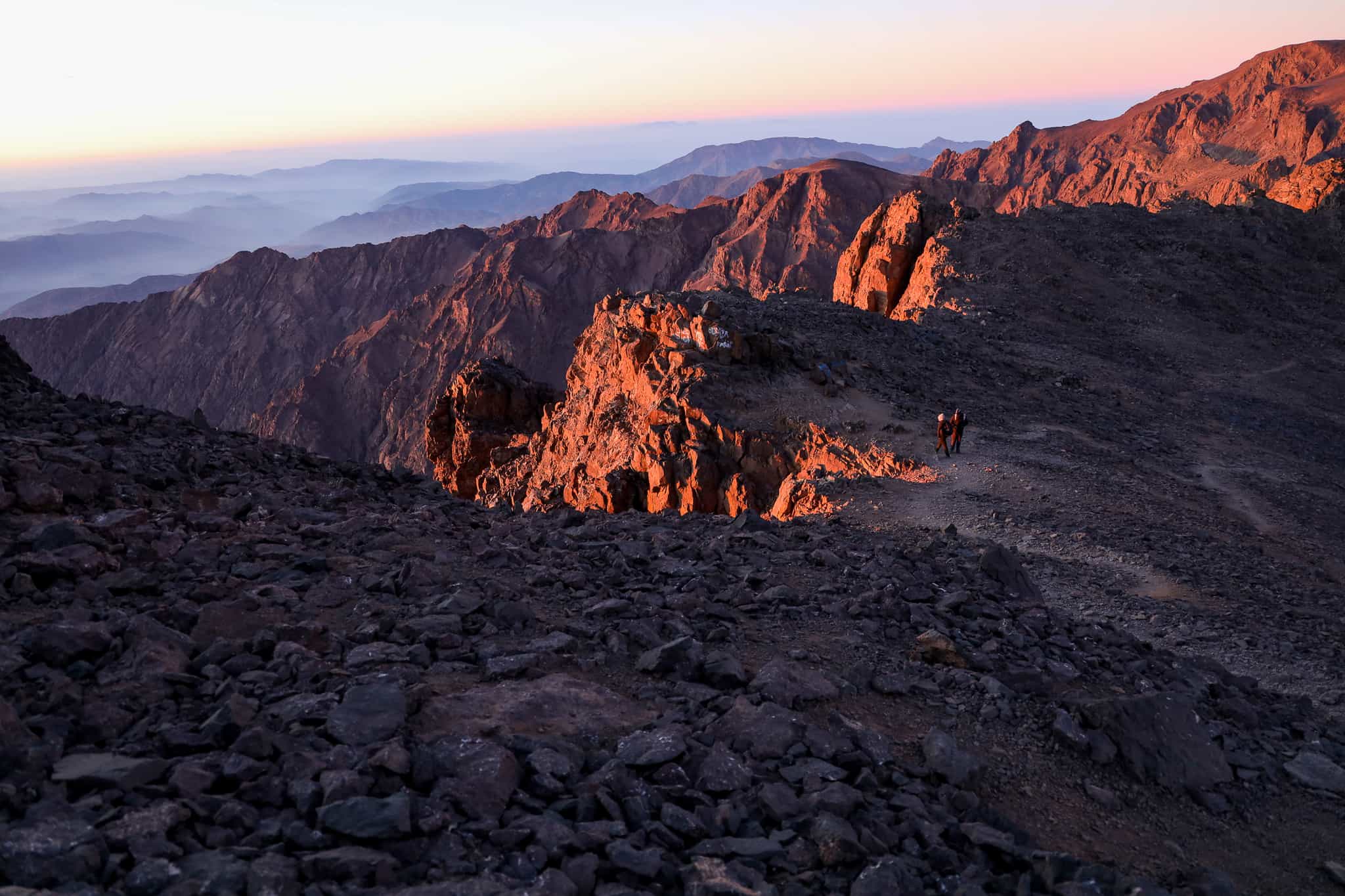
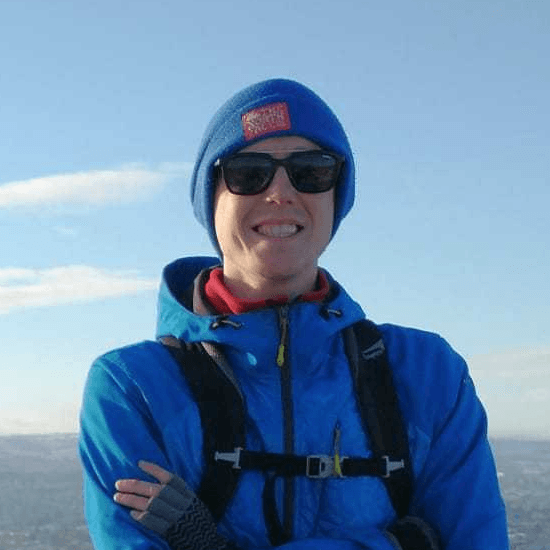
Need help finding flights?
From logistics and how to get there, to fitness, group dynamic and trip difficulty, Rory and his team of friendly experts are on hand to help.
We've got your back
Guaranteed to run
All Much Better Adventures trips are now guaranteed to run. Once you’ve booked your spot you can immediately make your travel arrangements, no uncertainty, no hanging about (excludes 'request to book' departures). Full details
Flexible payments
Secure your spot with the minimum deposit and pay off the remaining balance in as many instalments as you like, with no interest or fees. Full details
Happiness Guarantee
We’re so confident you’ll have an amazing time we’ll put our money on it. Full details
Full financial protection
To give you complete peace of mind Much Better Adventures is backed by ABTOT, ABTA and ATOL memberships. Full details
Tried & Trusted
Much Better Adventures is rated ‘Excellent’ on Trustpilot with over 1000 verified trip reviews averaging 4.8/5.
Connect before you go
You'll be invited to join a WhatsApp group to get to know each other before your big adventure together. Full details
DEPARTURE DATES
